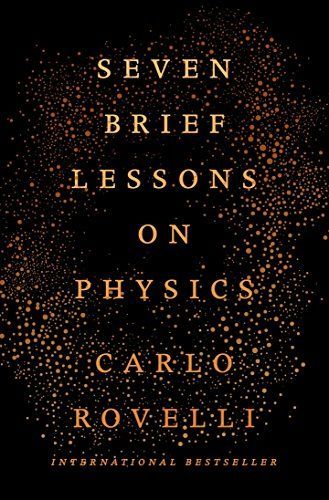
Seven Brief Lessons on Physics
Instant New York Times Bestseller "Short and resonant. . . . The essays in Seven Brief Lessons on Physics arrive like shots of espresso."--The New York Times "A startling and illustrative distillation of centuries of science."--The Economist "Lean, lucid and enchanting."--New Scientist The international bestseller that reveals all the beauty of modern physics in seven short and enlightening lessons Seven Brief Lessons on Physics is a book about the joy of discovery. Carlo Rovelli brings a playful, entertaining, and mind-bending introduction to modern physics, offering surprising--and surprisingly easy to grasp--explanations of Einstein's general relativity, quantum mechanics, elementary particles, gravity, black holes, the complex architecture of the universe, and the role humans play in this weird and wonderful world. He takes us to the frontiers of our knowledge: to the most minute reaches of the fabric of space, back to the origins of the cosmos, and into the workings of our minds. "Here, on the edge of what we know, in contact with the ocean of the unknown, shines the mystery and the beauty of the world," Rovelli writes. "And it's breathtaking."
Reviews
Timeo Williams@timeowilliams
César Steven Toribio@cesarsteven
Hernando@heagma
Jasmine Stanway@jestanwaywrites
Eva Decker@evadecker
Stef@faninos
Mudita@muditasis
Daniel Lauzon@daneroo
Dana Kraft@dkatx
Irene Alegre@irenealegre
brendan sudol@bren
Rebeca Keren Nuñez@rebecanunez
Cindy Lieberman@chicindy
Meriem💫@mer_iem
ana@judewillem
Pranav Mutatkar@pranavmutatkar
Tanja Hoffmann@sabsile
Kerry Gibbons@kerryiscool
Nikolay Bachiyski@nb
Jeni Enjaian@jenienjaian
Rebeca Keren Nuñez@rebecanunez
Hugo Ahlberg@hugo
Jeremy Cote@cote
Les Reynolds@lreynolds
Highlights
Amelia Hruby@ameliajo
Page 81
Amelia Hruby@ameliajo
Page 74
Amelia Hruby@ameliajo
Page 64
Amelia Hruby@ameliajo
Page 59
Amelia Hruby@ameliajo
Page 53
Amelia Hruby@ameliajo
Page 48
Amelia Hruby@ameliajo
Page 33
Amelia Hruby@ameliajo
Page 24
Amelia Hruby@ameliajo
Page 12